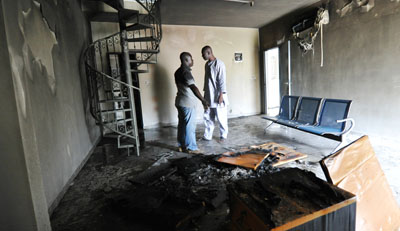Lagos, Nigeria, August 24, 2012–Ivorian authorities must immediately halt censorship of news outlets reporting critically on the government and investigate an armed assault on the offices of a publishing group, the Committee to Protect Journalists said today.
“We call on President Alassane Ouattara to demonstrate tolerance and a commitment to democratic principles,” said CPJ Africa Advocacy Coordinator Mohamed Keita from New York. “As the country weathers a period of great tension, the president can set an important example by allowing the voices of opposition to air their concerns and opinions, as harsh as they may be.”
The state-run National Press Council suspended the daily Le Temps on August 3 for 20 editions in connection with a July 24 article that it said defamed Ouattara, Raphael Lakpé, the council’s chairman, said in an interview on U.N.-sponsored station ONUCI FM. Le Temps, which is loyal to the former leader Laurent Gbagbo, had published an opinion piece on violence between supporters of Ouattara and those of Gbagbo and called the president a “ghoulish vampire,” according to news reports. Opposition groups have accused Ouattara and his allies of targeting supporters of Gbagbo in the past.
Le Temps’ editor-in-chief, Simplice Allard, was also suspended from writing for the paper for one month, news reports said.
On Sunday morning, a group of unidentified armed men attacked the offices of the Cyclone Media Group, in Abidjan, which publishes Le Temps, according to news reports. The men assaulted a security guard, set a room on fire, ransacked the offices, and stole several computers, Agence France-Presse reported. No one was injured in the attack, which caused significant damage to the offices, AFP said. Police have not made any arrests yet, local journalists said, adding that they believe the attack on the media group was in reprisal for Le Temps‘ critical coverage of Ouattara’s government.
In another case of official censorship, the National Press Council suspended Bôl’ Kotch, a private satirical newspaper, on August 8 for eight issues, over articles and cartoons critical of Ouattara that appeared in its July 27 edition, the state news agency AIP reported. The council singled out a caricature of an exchange between Ouattara and an army chief that suggested the president was using ethnic groups of traditional hunters to fight pro-Gbagbo supporters in the ongoing unrest in the country, according to news reports.
At least one journalist who has extensively covered the activities of former leader Gbagbo has told CPJ he fears for his life. Alain Tiéffi, photo editor of the state daily Fraternité Matin, said his neighbors had suggested to him that he leave their house in Yopougon, a suburb considered a Gbagbo stronghold. Security forces, in response to armed attacks against government positions, have in recent weeks conducted raids on houses in Yopougon and arrested people suspected of being linked to armed supporters of the ousted leader, according to news reports.
Tiéffi told CPJ that fighters loyal to Ouattara had ransacked his house in May 2011 and pointed a gun at his head. “I am the only journalist in the area I live. My wife, children, and in-laws are all living with me. Right now, I don’t know what to do. I am scared,” Tiéffi told CPJ.
Gérard Gnawa, a spokesman for the police in Abidjan, would not tell CPJ if they were investigating the case.
A group of six pro-opposition dailies have refused to publish their newspapers on August 24 and 25 to protest the attack on the Cyclone Media Group and the threats and assaults Ivorian journalists have faced in recent months, according to news reports. The group said the refusal to publish was to display “the risk of death that hangs over the lives of journalists.”
- For more data and analysis on the Ivory Coast, visit CPJ’s Ivory Coast page here.
